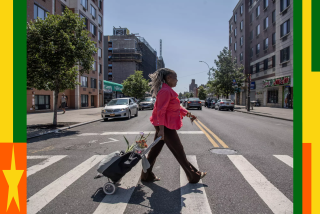Federal probe of counterfeit ring leads to five arrests
Troy Stroud couldn’t have known it at the time, but as he passed a crisp new $20 bill to the woman in the drive-through window at a Popeyes Chicken restaurant on North La Brea Avenue, he was doing more than just paying for his order, authorities said.
The alleged counterfeiter was passing a suspected bogus bill right in front of a quick-thinking U.S. Secret Service agent who had been following Stroud.
As Stroud’s car idled in line, the agent ran inside the restaurant, flashed his badge and took position behind the counter. He then watched as Stroud handed the allegedly fake currency to the clerk.
On Tuesday, federal authorities announced that Stroud and four other men have been arrested and charged in connection with a massive counterfeiting scheme that U.S. Atty. Thomas P. O’Brien called “one of the largest, if not the largest, counterfeit currency rings we have seen in Southern California.”
The ring is responsible for printing and distributing nearly $7 million in bogus currency over the last two years, authorities said.
Assistant U.S. Atty. Tracy L. Wilkison, the prosecutor on the case, said it was unusual not just because of the amount of money involved, but because agents were able to go up the food chain in their investigation.
“Most of the time what we have is a handful of poorly crafted bills in small amounts,” she said. “When we’re able to trace it all the way back to the source and stop the printing, that’s a big coup.”
The bills, allegedly produced with computers and ink jet printers, were of particular concern to agents because they had proved difficult to detect and were passed in locations across the United States.
Among those charged in the scheme was Albert Edward Talton, 44, of Lawndale, who is accused of printing the fake cash.
A search of Talton’s home turned up “a full-scale counterfeit currency manufacturing plant” and more than $1 million in completed and partially completed fake bills, according to an affidavit filed in U.S. District Court in Los Angeles. Among the evidence found in the baldheaded suspect’s trash were 20 bottles of Aqua Net and White Rain hair spray.
Authorities say the hair product is commonly used to coat fake bills to block the counterfeit-detecting pens used by merchants.
As he was being taken into custody, Talton admitted that he had printed between $5 million and $6 million in fake currency, authorities said.
Agents said Talton told them that he began experimenting by scanning a $10 bill into his computer a couple of years ago and reproducing it, and that he branched out from there. At first, only he used the bogus money, but then he began selling it. He allegedly admitted to making between $800,000 and $900,000 in legitimate currency as a result of his operation.
The arrests last week cap a three-month Secret Service probe that began with a tip. Court documents depict a fast-paced investigation in which agents used surveillance and confidential informants to determine how the alleged ring worked and to identity its members.
The unnamed informants, according to court papers, were low-level criminals. One was working for cash. Another was getting paid as well, but also hoped to avoid a parole violation in exchange for his cooperation.
On several occasions, the agents gave the informants real money and sent them to buy suspected counterfeit currency from brokers they believed were being supplied by Talton.
One of the suspects seemed none too subtle for an alleged counterfeiter. As federal agents waited for a deal to go down, the man pulled into the parking lot of a Hawthorne apartment complex in a bright orange Mercedes-Benz. In case the car hadn’t attracted agents’ attention, it sported a vanity tag bearing the suspect’s last name: “MCCORRY.”
A short time later, agents were able to identify the driver as Paul T. McCorry. Following his arrest last week, McCorry has been charged with dealing in counterfeit securities.
Also arrested were: David Goldberg, 35, of Sherman Oaks, who is accused of helping to manufacture the counterfeit bills; Corey Nero, 38, of Hawthorne; and Stroud, 41, of Playa Vista, the man accused of passing the bad bill at the Popeyes drive-through. A sixth suspect, Earnest J. Alexander, 40, of Hawthorne is being sought by authorities.
Ray Maytorena, special agent in charge of the Secret Service in Los Angeles, said the case represented a relatively new breed of counterfeiter. In the past, he said, crooks used offset printing presses to produce large quantities of fake cash, which then took a substantial time to get rid of, giving investigators precious time to follow the paper trail.
These days, he said, computers and high-tech printers have made printing counterfeit money considerably easier. He said counterfeiters tend to print less at one time and pass it much more quickly.
“That’s what makes it so difficult to catch them,” he said.
--
More to Read
Start your day right
Sign up for Essential California for news, features and recommendations from the L.A. Times and beyond in your inbox six days a week.
You may occasionally receive promotional content from the Los Angeles Times.







